-
ORIGINAL ARTICLE07-29-2024
Contribution of informal caregivers to self-care in individuals with heart failure
Revista Brasileira de Enfermagem. 2024;77(3):e20230492
Abstract
ORIGINAL ARTICLEContribution of informal caregivers to self-care in individuals with heart failure
Revista Brasileira de Enfermagem. 2024;77(3):e20230492
DOI 10.1590/0034-7167-2023-0492
Views0See moreABSTRACT
Objectives:
to evaluate the contribution of informal caregivers to the self-care of individuals with heart failure.
Methods:
a cross-sectional study was conducted with 87 caregivers from March to October 2022 in the city of João Pessoa/PB. The caregivers’ contribution was assessed using the Caregiver Contribution to Self-Care of Heart Failure Index instrument. Scores ≥ 70 points indicate adequate contribution. Data were analyzed using descriptive statistics and Spearman’s correlation.
Results:
the sample consisted of 81.6% female caregivers. Median scores obtained for the self-care contribution scales were: 63.3 for maintenance; 55.5 for management; and 66.6 for confidence. Caregivers never or rarely recommended monitoring body weight, regular physical exercise, extra use of diuretics, and fluid restriction.
Conclusions:
informal caregivers showed inadequate contribution in the areas of maintenance, management, and confidence in self-care of individuals with heart failure.
-
07-29-2024
Reflections on theoretical framework use in nursing research
Revista Brasileira de Enfermagem. 2024;77(3):e20230486
Abstract
Reflections on theoretical framework use in nursing research
Revista Brasileira de Enfermagem. 2024;77(3):e20230486
DOI 10.1590/0034-7167-2024-0486
Views0See moreABSTRACT
Objectives:
to reflect on theoretical framework use in nursing research.
Methods:
a theoretical-reflexive study, based on concepts and constructs pertinent to using nursing theories and other sciences, considering issues of epistemology or philosophy of science.
Results:
we presented what it is and why to do nursing research and what a theoretical framework is and why to use it, in addition to some considerations regarding theoretical framework use in nursing research, essential for constructing disciplinary knowledge, which enables the materialization of researchers’ work and the presentation of propositions resulting from investigations in and for nursing as a discipline and science.
Final Considerations:
based on a reflection based on epistemological conceptions, it is possible to affirm that a theoretical framework is the core of researchers’ thinking, delimiting a problem to be investigated and, based on it, outlining methodological strategies to be followed, supporting nursing action and thinking as discipline and science.

-
REVIEW07-29-2024
Nursing diagnoses for people hospitalized with heart failure: an integrative review
Revista Brasileira de Enfermagem. 2024;77(3):e20230471
Abstract
REVIEWNursing diagnoses for people hospitalized with heart failure: an integrative review
Revista Brasileira de Enfermagem. 2024;77(3):e20230471
DOI 10.1590/0034-7167-2023-0471
Views0See moreABSTRACT
Objectives:
to identify in the literature the main nursing diagnoses according to the NANDA-I diagnostic classification for people hospitalized with heart failure.
Methods:
an integrative literature review, carried out in February 2019 and updated in July 2023, in the MEDLINE via PubMed, LILACS, SciELO and CINAHL databases. Given the use of acronym PEO, studies without a time cut in Portuguese, English and Spanish were included. Descriptive analysis was carried out to present the identified information.
Results:
analysis of 27 articles identified 24 nursing diagnoses, with emphasis on Decreased Cardiac Output, Excessive Fluid Volume, Decreased Activity Tolerance and Fatigue.
Final Considerations:
evidence can contribute to better diagnostic decisions centered on people with heart failure in search of more assertive health results and have the potential to support future studies on a possible syndromic pattern in this population.

-
ORIGINAL ARTICLE07-29-2024
Primary Health Care in transitional care of people with stroke
Revista Brasileira de Enfermagem. 2024;77(3):e20230468
Abstract
ORIGINAL ARTICLEPrimary Health Care in transitional care of people with stroke
Revista Brasileira de Enfermagem. 2024;77(3):e20230468
DOI 10.1590/0034-7167-2024-0468
Views0See moreABSTRACT
Objectives:
to understand the role of Primary Health Care teams in caring for people with stroke after hospital discharge.
Methods:
single case study, with integrated units of analysis, with a qualitative approach. Data triangulation occurred through interviews with professionals and family caregivers involved in transition of care, in addition to direct observations in rounds and document analysis. For the analyses, the analytical strategies of theoretical propositions and construction of explanations were used, with the help of ATLAS.ti®.
Results:
the importance of counter-referral, the role of community health workers and the multidisciplinary team, health promotion, secondary prevention, home visits as a visceral attribute and nurses as care managers are evident.
Final Considerations:
the high demand on teams and the Social Determinants of Health interfere with adequate continuity of care. Transitional care programs that enable continuity of care are recommended.
-
ORIGINAL ARTICLE07-29-2024
Completeness of variables in Hospital-Based Cancer Registries for prostatic malignant neoplasm
Revista Brasileira de Enfermagem. 2024;77(3):e20230467
Abstract
ORIGINAL ARTICLECompleteness of variables in Hospital-Based Cancer Registries for prostatic malignant neoplasm
Revista Brasileira de Enfermagem. 2024;77(3):e20230467
DOI 10.1590/0034-7167-2023-0467
Views0See moreABSTRACT
Objectives:
to analyze the completeness of variables from Hospital-Based Cancer Registries of cases of prostate neoplasm in the Oncology Care Network of a Brazilian state between 2000 and 2020.
Methods:
an ecological time series study, based on secondary data on prostate cancer Hospital-Based Cancer Registries prostate. Data incompleteness was classified as excellent (<5%), good (between 5%-10%), fair (10%-20%), poor (20%-50%) and very poor (>50%), according to the percentage of lack of information.
Results:
there were 13,519 cases of prostate cancer in the Hospital-Based Cancer Registries analyzed. The variables “family history of cancer” (p<0.001), “alcoholism” (p<0.001), “smoking” (p<0.001), “TNM staging” (p<0.001) had a decreasing trend, while “clinical start of treatment” (p<0.001), “origin” (p=0.008) and “occupation” (p<0.001) indicated an increasing trend.
Conclusions:
most Hospital-Based Cancer Registries variables showed excellent completeness, but important variables had high percentages of incompleteness, such as TNM and clinical staging, in addition to alcoholism and smoking.
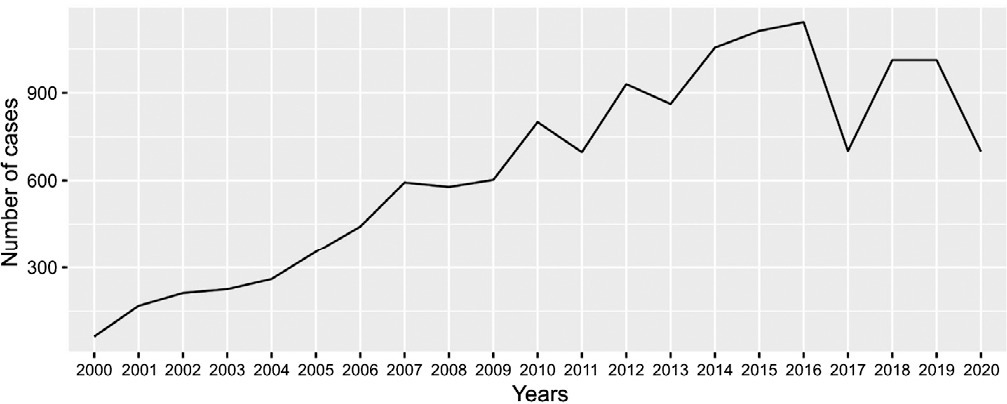
-
ORIGINAL ARTICLE07-29-2024
Disrupted mother-fetus dyad risk in high-risk pregnancies: a Middle-Range Theory
Revista Brasileira de Enfermagem. 2024;77(3):e20230464
Abstract
ORIGINAL ARTICLEDisrupted mother-fetus dyad risk in high-risk pregnancies: a Middle-Range Theory
Revista Brasileira de Enfermagem. 2024;77(3):e20230464
DOI 10.1590/0034-7167-2023-0464
Views0See moreABSTRACT
Objectives:
to develop and evaluate a Middle-Range Theory for the nursing diagnosis “Disrupted Mother-Fetus Dyad Risk” in high-risk pregnancies.
Methods:
this methodological study was conducted in two stages: theory development and evaluation. Dorothea Orem’s General Nursing Model was used as the theoretical-conceptual foundation. Evaluation was conducted using the Delphi method with seven judges, and consensus was achieved when the Content Validity Index of the evaluated items was ≥ 0.80.
Results:
the theory identified 20 elements of the nursing diagnosis “Disrupted Mother-Fetus Dyad Risk” (10 risk factors, 4 at-risk populations, and 6 associated conditions), 14 propositions, and 1 pictogram. After two rounds of evaluation, the theory was considered consistent, with consensus reached for all items, each achieving a Content Validity Index ≥ 0.80.
Conclusions:
the Middle-Range Theory included biopsychosocial factors explaining the nursing phenomenon “Disrupted Mother-Fetus Dyad Risk,” which aids in nurses’ diagnostic reasoning.
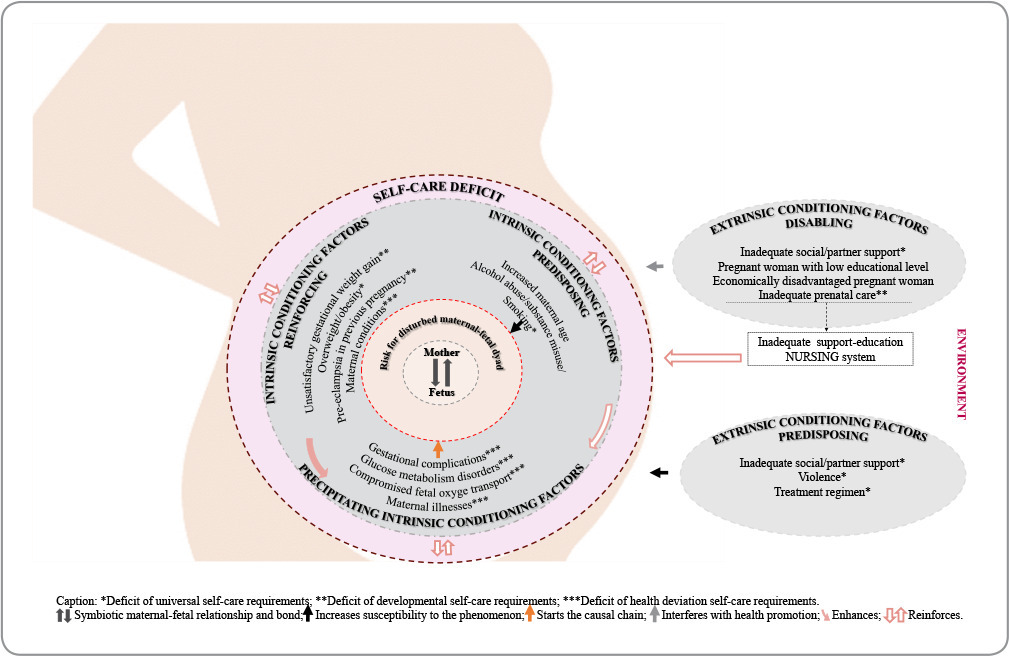
-
ORIGINAL ARTICLE07-29-2024
Mental health of parents of children and adolescents who require special health care
Revista Brasileira de Enfermagem. 2024;77(3):e20230457
Abstract
ORIGINAL ARTICLEMental health of parents of children and adolescents who require special health care
Revista Brasileira de Enfermagem. 2024;77(3):e20230457
DOI 10.1590/0034-7167-2023-0457
Views0See moreABSTRACT
Objective:
To identify the manifestations presented by parents of children and adolescents who require special health attention that can impact their mental health.
Methods:
exploratory, qualitative research, based on the concept of vulnerability, with data collection carried out through interviews with 18 parents of children and adolescents with special health care needs, hospitalized in the pediatric ward of a hospital in Paraná, between May/2017 and May/ 2018. Data analyzed by inductive thematic analysis.
Results:
parents experienced situations of vulnerability when providing care at home, with repercussions on their mental health, expressed by manifestations of lack of protection, anxiety and depression.
Final considerations:
It is important that health professionals seek to expand actions to promote care and reduce situations that generate threats, insecurities, concerns and damage to the health of parents, which can impact and further weaken care for children and adolescents who need attention especially health.
-
ORIGINAL ARTICLE07-29-2024
Evidence of validity of the Risk Self-Medication Questionnaire focused on Health Literacy
Revista Brasileira de Enfermagem. 2024;77(3):e20230386
Abstract
ORIGINAL ARTICLEEvidence of validity of the Risk Self-Medication Questionnaire focused on Health Literacy
Revista Brasileira de Enfermagem. 2024;77(3):e20230386
DOI 10.1590/0034-7167-2023-0386
Views0See moreABSTRACT
Objectives:
to analyze the validity evidence of the internal structure of the Risk Self-Medication Questionnaire Focused on Health Literacy.
Methods:
a psychometric study with 499 adults. The internal structure was assessed with exploratory and confirmatory factor analysis to prove the adjustment. Internal consistency was measured by composite reliability and McDonald’s omega coefficient (ω).
Results:
the parameters revealed a model of 35 items distributed across four factors, explaining 56% of the total variance, with factor loadings ranging from 0.31 to 0.85 and adequate communalities. Accuracy (0.79
Conclusions:
an instrument was obtained with good evidence of structural validity for measuring self-medication.
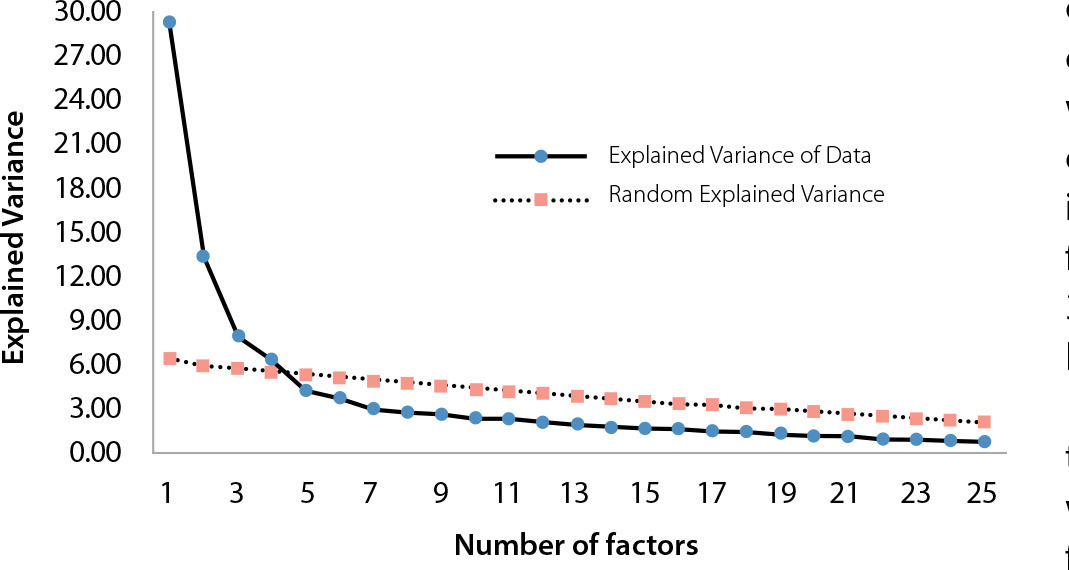
-
ORIGINAL ARTICLE12-04-2023
Burnout, ethical climate and work organization in covid-19 intensive care units: mixed method study
Revista Brasileira de Enfermagem. 2023;76:e20220684
Abstract
ORIGINAL ARTICLEBurnout, ethical climate and work organization in covid-19 intensive care units: mixed method study
Revista Brasileira de Enfermagem. 2023;76:e20220684
DOI 10.1590/0034-7167-2022-0684
Views0See moreABSTRACT
Objectives:
to analyze the association between burnout and the perception of the ethical climate in nursing professionals in the covid-19 Intensive Care Unit and the relationship with the organization of work from the perspective of managers of these units.
Methods:
mixed method study conducted in three university hospitals in southern Brazil from December 2021 to March 2022. A cross-sectional study was developed with 110 nursing professionals, followed by an exploratory-descriptive study through semi-structured interviews with six managers. Descriptive and analytical statistics and discursive textual analysis were used.
Results:
the prevalence of burnout was 10% and the perception of negative ethical climate was 24.5%. The association between burnout and ethical climate revealed overload and fatigue during working hours, related to tension, fear, and stress that emerged from the consequences of the organization and relations of work in the covid-19 Intensive Care Unit.
Conclusions:
there was an association between burnout and ethical climate and elements of the work organization.
-
ERRATUM02-26-2024
ERRATUM
Revista Brasileira de Enfermagem. 2024;77(1):e20160061
Abstract
ERRATUMERRATUM
Revista Brasileira de Enfermagem. 2024;77(1):e20160061
DOI 10.1590/0034-7167.20247701e03
Views2In the article “Nurses in the labor market: professional insertion, competencies and skills”, with DOI number: , published in Revista Brasileira de Enfermagem, 2017;70(6):1220-6, on page 1225:Include before REFERENCES:[…]See more -
ERRATUM06-14-2024
ERRATUM
Revista Brasileira de Enfermagem. 2024;77(2):e2024n2e06
Abstract
ERRATUMERRATUM
Revista Brasileira de Enfermagem. 2024;77(2):e2024n2e06
DOI 10.1590/0034-7167.20247702e06
Views2In the article “Is there scientific relevance to the plot of films and documentaries about eating disorders?”, with DOI number: , published in Revista Brasileira de Enfermagem, 2024;77(1):e20220547, page 7:Where it read:[…]See more -
ORIGINAL ARTICLE07-29-2024
Educational technology for multidisciplinary training for managing waiting lists for elective patients
Revista Brasileira de Enfermagem. 2024;77(3):e20230299
Abstract
ORIGINAL ARTICLEEducational technology for multidisciplinary training for managing waiting lists for elective patients
Revista Brasileira de Enfermagem. 2024;77(3):e20230299
DOI 10.1590/0034-7167-2023-0299
Views1See moreABSTRACT
Objectives:
to construct and assess an educational technology for managing patient waiting lists for multidisciplinary training.
Methods:
study supported by Instructional Design – ADDIE model, whose stages of construction of educational technology were developed in the form of a multi-professional training course. Its respective content assessment was carried out by a committee of experts from 2021 to 2022. The analysis occurred based on the proportion of content adequacy with 95% Confidence Interval.
Results:
seventeen products were created as educational technology learning objects: five storyboards; four videos; three comic books; two pedagogical action plans; a mind map; and a YouTube® playlist. Nine experts assessed content adequacy, which reached 0.89.
Conclusions:
this educational technology contributes to the performance of professionals who manage waiting lists by reducing inequalities, alleviating differences, in addition to promoting equity in care and good health for patients in the Brazilian Health System.

-
REVIEW11-22-2024
Spirituality and religiosity in children, adolescents and their families in a vulnerable context: a scoping review
Revista Brasileira de Enfermagem. 2024;77(5):e20230425
Abstract
REVIEWSpirituality and religiosity in children, adolescents and their families in a vulnerable context: a scoping review
Revista Brasileira de Enfermagem. 2024;77(5):e20230425
DOI 10.1590/0034-7167-2023-0425
Views1See moreABSTRACT
Objective:
to map evidence in the literature on the spirituality and religiosity of children, adolescents and their families in social vulnerability.
Methods:
this is a scoping review based on the JBI methodology, with the search without delimiting the time period, in English, Portuguese and Spanish, in the Virtual Health Library, PubMed, Embase, Cochrane Library, Scopus and Web of Science databases.
Results:
twenty-two studies were identified. The most studied population were adolescents, followed by children and their families. Regarding the setting, the context of vulnerability related to the low socioeconomic level experienced by these populations was highlighted. Furthermore, spirituality and religiosity were considered important for coping, social support, purpose and strength.
Conclusion:
there is an influence of spirituality and religiosity in the lives of children, adolescents and families, being a protective factor and a source of comfort, playing essential tools for living in context.

-
ORIGINAL ARTICLE12-13-2024
Stress in nursing workers caring for people with COVID-19
Revista Brasileira de Enfermagem. 2024;77(5):e20230542
Abstract
ORIGINAL ARTICLEStress in nursing workers caring for people with COVID-19
Revista Brasileira de Enfermagem. 2024;77(5):e20230542
DOI 10.1590/0034-7167-2023-0542
Views1See moreABSTRACT
Objectives:
to analyze stress from the perspective of nursing workers caring for people with COVID-19 in a public hospital in the Recôncavo region of Bahia.
Methods:
this is an exploratory qualitative study, conducted through semi-structured interviews. The data were analyzed using word clouds, similarity trees, and content analysis.
Results:
nursing workers were exposed to stress while attending to patients with COVID-19. The reported stressors in the workplace included: work overload, lack of planning, speed in performing tasks, fatigue, lack of participation in decision-making, lack of support from management, technological changes, excessive responsibility without preparation, interpersonal conflicts, and professional undervaluation.
Conclusions:
exposure to these stressors leads to emotional exhaustion and demotivation, which were intensified during the COVID-19 pandemic.

-
ORIGINAL ARTICLE01-13-2024
Knowledge, Attitudes, and Practices of nurses regarding blood culture collection
Revista Brasileira de Enfermagem. 2024;77(6):e20230424
Abstract
ORIGINAL ARTICLEKnowledge, Attitudes, and Practices of nurses regarding blood culture collection
Revista Brasileira de Enfermagem. 2024;77(6):e20230424
DOI 10.1590/0034-7167-2023-0424
Views2See moreABSTRACT
Objectives:
to investigate the knowledge, attitudes, and practices of nurses regarding blood culture collection.
Methods:
a cross-sectional study was conducted in five Brazilian public hospitals with 112 nurses. Data were collected using an adapted questionnaire and analyzed through descriptive and inferential statistics.
Results:
nurses who did not consider themselves capable of collecting blood cultures had a 72% lower chance of performing the collection at the recommended site and an 83% lower chance of using the same needle for blood inoculation into the vials. Nurses working in the emergency department had a 75% lower chance of knowing the international benchmark for blood culture contamination rates, and those with less than 5 years in the position decreased their chance of accuracy in this matter by 79%.
Conclusions:
there are gaps in the knowledge, attitudes, and practices of nurses regarding blood culture collection. Standardization of the technique, periodic education, supervision and guidance of the collection team, and process auditing are recommended coping strategies.

-
ORIGINAL ARTICLE01-10-2024
Inventory of ethical problems in mobile pre-hospital care
Revista Brasileira de Enfermagem. 2024;77:e20230539
Abstract
ORIGINAL ARTICLEInventory of ethical problems in mobile pre-hospital care
Revista Brasileira de Enfermagem. 2024;77:e20230539
DOI 10.1590/0034-7167-2023-0539
Views1See moreABSTRACT
Objective:
to construct and validate the content of an inventory of ethical problems experienced by nurses in mobile pre-hospital care.
Method:
a psychometric approach study, developed with the following stages: (1) instrument construction through a theoretical matrix based on deliberative bioethics, scoping review and online qualitative research; (2) content validity by judges; (3) pre-testing with Mobile Emergency Care Service nurses in various Brazilian states. For content validity analysis, the Content Validity Ratio was calculated (CVR>0.45 for judges and CVR>0.35 for the target population).
Results:
the instrument had 44 items, distributed across four dimensions.
Final considerations:
the constructed instrument presented sources of evidence of content validity, providing good psychometric measurements and constituting a useful tool for nurses’ practice in the pre-hospital setting.

-
REVIEW11-19-2022
Nursing care for bed bath in patients with COVID-19: an integrative review
Revista Brasileira de Enfermagem. 2022;75:e20200704
Abstract
REVIEWNursing care for bed bath in patients with COVID-19: an integrative review
Revista Brasileira de Enfermagem. 2022;75:e20200704
DOI 10.1590/0034-7167-2020-0704
Views0See moreABSTRACT
Objective:
to identify the main nursing care procedures for performing bed bath in patients with COVID-19.
Method:
an integrative literature review. Five stages were followed for this research: research question elaboration (identification of the problem), search of studies in literature, study assessment, data analysis, and presentation of review. To search for primary studies, the VHL and SciELO databases were selected.
Results:
initially, 55 publications were found. After reading and analyzing the abstracts, the sample consisted of 15 studies.
Conclusion:
patients with the new coronavirus have specific care to perform a bed bath, oral, intimate and skin hygiene. It is important that professionals use adequate personal protective equipment, perform humanized care, continuously observing patients’ vital signs to avoid occurrence of adverse events, promoting patient safety.
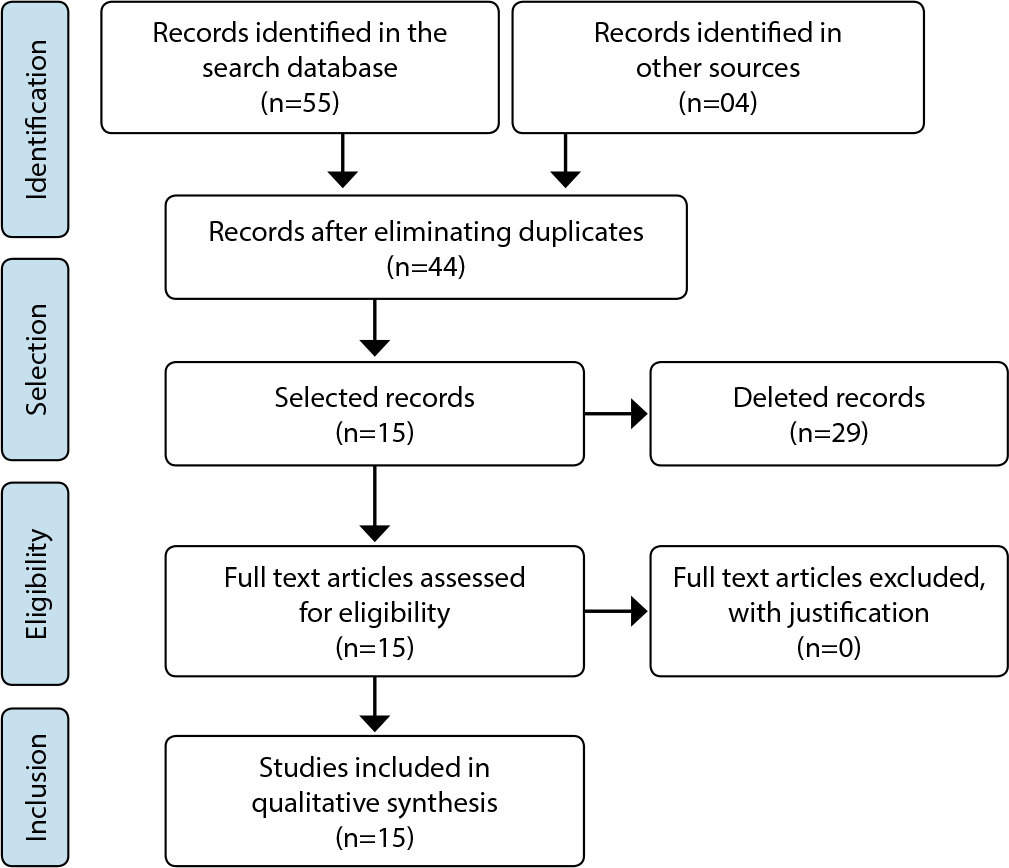
-
04-26-2021
Content validity of the nursing diagnostic Breathing Pattern, Ineffective, in children with congenital heart defects
Revista Brasileira de Enfermagem. 2021;74:e20190844
Abstract
Content validity of the nursing diagnostic Breathing Pattern, Ineffective, in children with congenital heart defects
Revista Brasileira de Enfermagem. 2021;74:e20190844
DOI 10.1590/0034-7167-2019-0844
Views0See moreABSTRACT
Objective:
To estimate the content validity of the nursing diagnostic Breathing Pattern, Ineffective, in children with congenital heart defects.
Method:
Methodological study in two stages: 1) integrative literature review; 2) content validation, with 23 nurses. An instrument with 10 related factors and 21 defining characteristics for data collection was used. The analysis by the evaluators was carried out using the relevance criteria. The Content Validity Index was used. Valid results were those above 0.9 with a Wilcoxon test above 0.05.
Results:
The final proposal incorporates nine from the ten causal factors. From them, five do not belong in the NANDA-I list. Regarding the defining characteristics, they were all considered to be relevant, and five are not among the list of signs and symptoms of the NANDA-I taxonomy.
Conclusion:
The findings of this study include specific elements of the pediatric population with congenital heart defect which are not present in the structure of the diagnostic being studied.
-
REVIEW11-26-2022
Parental burnout: a scoping review
Revista Brasileira de Enfermagem. 2022;75:e20210203
Abstract
REVIEWParental burnout: a scoping review
Revista Brasileira de Enfermagem. 2022;75:e20210203
DOI 10.1590/0034-7167-2021-0203
Views0See moreABSTRACT
Objective:
to map available evidence on parental burnout theme.
Method:
scoping review as according to the Joanna Briggs Institute. Search in January 2021, in six databases of publications in English, Portuguese or Spanish, without time limits. Data extracted and descriptively analyzed by three independent researchers.
Results:
374 articles were identified and 20 were included in the final sample, all published in English, from 2017 onwards. Parental burnout is a complex, multifactorial problem, distinct from burnout cases, depressive symptoms and other mental health alterations. It affects 0.2 to 20% of parents, has validated and suitable instruments for measurement; if not treated, can have consequences on marital life, work relationships, child neglect and violence.
Conclusions:
this is a recent theme that needs to be explored, due to the possible impact on children’s and families’ health and on parents’ work processes. Protocol registered in the Open Science Framework ().
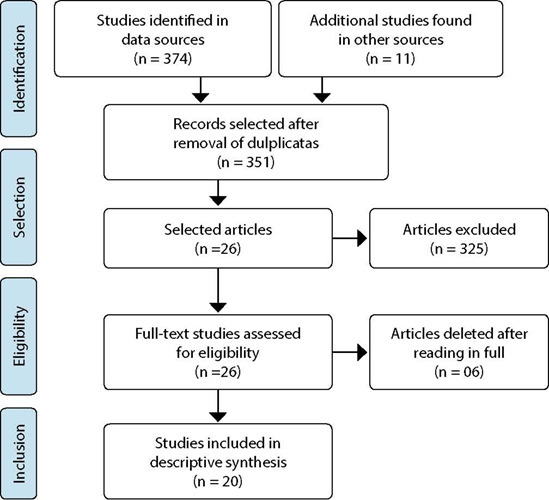
-
ORIGINAL ARTICLE03-24-2021
Content and usability validation of the Retire with Health web software
Revista Brasileira de Enfermagem. 2021;74(1):e20200133
Abstract
ORIGINAL ARTICLEContent and usability validation of the Retire with Health web software
Revista Brasileira de Enfermagem. 2021;74(1):e20200133
DOI 10.1590/0034-7167-2020-0133
Views0See moreABSTRACT
Objectives:
to validate the content and usability of the Retire with Health web software.
Methods:
a methodological study. The content validation was carried out by seven experts in the aging subject, using an instrument that evaluated the objectives, contents, relevance, and the environment of the web software. Usability was validated by seven experts in software development, referring to ergonomics, functionality, usability, and efficiency. The data were submitted to statistical analysis, described by calculating the Content Validity Index.
Results:
the global Content Validity Index found 0.97 for the usability aspects and 1.00 for the content. After incorporating all the experts’ suggestions, the Retire with Health web software was made available on the internet (www.aposentarsecomsaude.com.br).
Conclusions:
content validation and usability showed that the web software meets the objective of supporting reflection on retirement, with a high level of agreement among experts.
-
ORIGINAL ARTICLE10-17-2022
Construction and validation of clinical scenarios for training informal caregivers of dependent persons
Revista Brasileira de Enfermagem. 2022;75(5):e20220140
Abstract
ORIGINAL ARTICLEConstruction and validation of clinical scenarios for training informal caregivers of dependent persons
Revista Brasileira de Enfermagem. 2022;75(5):e20220140
DOI 10.1590/0034-7167-2022-0140
Views0See moreABSTRACT
Objective:
To construct and validate three clinical scenarios for training dependent persons’ informal caregivers.
Methods:
Methodological study, conducted between January and August 2021, in a municipality in the northwest of the state of Paraná. It was developed in two stages: construction of scenarios; and content validation by experts (n = 12). To estimate the degree of agreement between the experts, the content validity index was used, and 80% was considered an acceptable rate of agreement.
Results:
The simulation scenarios proved appropriate, obtaining an average value of 91.6%. However, some adjustments were made in their organization pertaining clarity in the wording of guidelines, as suggested by the expert validators.
Conclusions:
The construction and validation of the clinical scenarios proved to be adequate and relevant for use in the training of informal caregivers of dependent persons.
-
ORIGINAL ARTICLE08-08-2022
Social and territorial inequalities in the mortality of children and adolescents due to COVID-19 in Brazil
Revista Brasileira de Enfermagem. 2022;75(6):e20210482
Abstract
ORIGINAL ARTICLESocial and territorial inequalities in the mortality of children and adolescents due to COVID-19 in Brazil
Revista Brasileira de Enfermagem. 2022;75(6):e20210482
DOI 10.1590/0034-7167-2021-0482
Views0See moreABSTRACT
Objective:
To analyze the mortality rate of COVID-19 among children and adolescents aged 0 to 14 years.
Methods:
Ecological and exploratory study of children’s mortality rate by COVID-19 in Brazil, from February to October 2020. The study used the Severe Acute Respiratory Syndrome database to collect the data and made the analysis using descriptive spatial statistics by age and race/color classification.
Result:
The mortality rate due to COVID-19 represented 1.34 deaths per one hundred thousand in the total group evaluated. The age group with the highest frequency and mortality rate was 1 to 4 years of age. There is a higher frequency of deaths in the brown and Indigenous population.
Conclusion:
The distribution of deaths due to COVID-19 is unequal in the national territory, and there is a wide variation in the mortality rate by age and race/color groups.

-
EXPERIENCE REPORT06-09-2021
Genograma e ecomapa como estratégias lúdicas de ensino de enfermagem na Atenção Primária à Saúde
Revista Brasileira de Enfermagem. 2021;74(3):e20201106
Abstract
EXPERIENCE REPORTGenograma e ecomapa como estratégias lúdicas de ensino de enfermagem na Atenção Primária à Saúde
Revista Brasileira de Enfermagem. 2021;74(3):e20201106
DOI 10.1590/0034-7167-2020-1106
Views0See moreABSTRACT
Objectives:
to report the experience using ludic strategies for the teaching-learning in the elaboration of the genogram and ecomap; and the use of these instruments by Nursing students in the Primary Health Care services.
Methods:
an experience report of the discipline Integrity of Care I (Integralidade do Cuidado I), of the Nursing School of Ribeirao Preto. Problems scenarios were created to approach the genogram and ecomap, comprising different family arrangements, represented by pedagogic puppets.
Results:
students actively participated, held collective discussions, elaborated genogram, and ecomap, identified the type of family, and the stages of the vital cycle, providing increased dynamics and interactivity. Subsequently, in supervised activities in Primary Health Care services, students elaborated the genogram and ecomap to monitor a family.
Final Considerations:
the use of ludic strategies propitiates the teamwork, active interaction of the group, and the creativity. The articulation between theory and practice resulted in a significant learning.
-
ORIGINAL ARTICLE08-22-2022
Women who live in mining on the French-Brazilian border: daily challenges
Revista Brasileira de Enfermagem. 2022;75(6):e20210688
Abstract
ORIGINAL ARTICLEWomen who live in mining on the French-Brazilian border: daily challenges
Revista Brasileira de Enfermagem. 2022;75(6):e20210688
DOI 10.1590/0034-7167-2021-0688
Views0See moreABSTRACT
Objectives:
to describe the daily life of Brazilian women who work in mining.
Methods:
a descriptive, qualitative study, with analysis based on the theory of Symbolic Interactionism. Non-participant observations, field diary writing, sociodemographic form, non-directive interviews, recorded and transcribed in full, were carried out with 19 women who work in mining areas on the French-Brazilian Amazon border.
Results:
two categories emerged: Life trajectories: women’s work in mining; Woman, mother and prospector: the multiple facets of gender inequality on the Amazon border.
Final Considerations:
assessing the daily experiences of women in the Amazonian mines allowed identifying their health needs, evidencing the need to direct and implement public and social policies and health practices for comprehensive care of these women’s health.
Search
Search in:
Nuvem de Tags
Adolescente (85) Atenção Primária à Saúde (239) COVID-19 (91) Criança (91) Cuidados de Enfermagem (269) Educação em Enfermagem (151) Educação em Saúde (139) Enfermagem (930) Enfermagem Pediátrica (86) Estudantes de Enfermagem (77) Estudos de Validação (131) Família (87) Idoso (208) Promoção da Saúde (99) Qualidade de Vida (104) Saúde do Trabalhador (86) Saúde Mental (145) Saúde Pública (82) Segurança do Paciente (150) Tecnologia Educacional (100)



